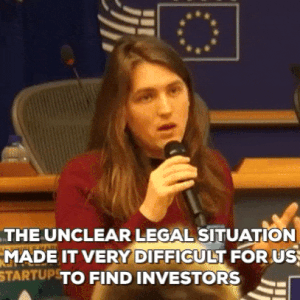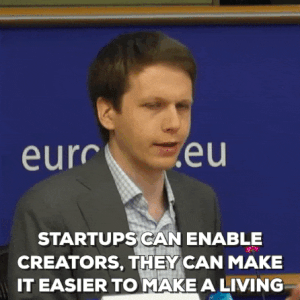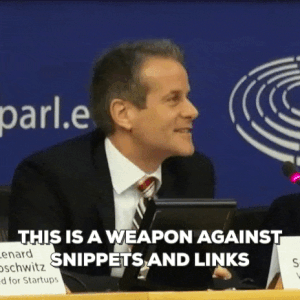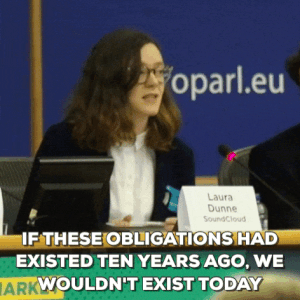European startups’ ability to innovate, to compete in the global internet economy and to create growth and jobs in Europe is under threat by a proposed expansion of copyright.
These rules would ensure that the next Facebook or Google can not come from Europe, founders from all over the EU warned at a recent meeting at the European Parliament in Brussels.
First, let’s hear from the startups themselves:
Here’s what the proposed law would do:
Keeping EU startups small
 The law introduces new hurdles that only big internet companies can handle, making it much harder for new startups to raise funding and grow, experts and stakeholders warn:
The law introduces new hurdles that only big internet companies can handle, making it much harder for new startups to raise funding and grow, experts and stakeholders warn:
What you are doing is giving players that are already strong in the market place an even stronger position, and you take the legal certainty away for the startup initiatives to grow and become strong players themselves. Tweet this! – Martin Senftleben, Professor of Intellectual Property, VU University Amsterdam
The draft introduces more legal uncertainty, creating barriers to entry and disincentivizing investment in European tech when we are at a stage where we really need to encourage that so European businesses can really compete on a global scale.
– Laura Dunne, Senior Policy Manager, SoundCloud
Startup story
Tersee was hindered by a very similar law in Germany:
After 4 years of lawsuits it’s still unclear whether this new law applies to our search engine. The unclear legal situation made it very difficult for us to find any investors. We have had to spend a lot of money on lawyers instead of new development.
– Mikael Voss, Founder
Idea: Real-time search engine for news and current events
Location: Berlin, Germany
Founded: 2013
Preventing much-needed innovation
 The law is intended to support large European news publishers and record labels – industries that are facing major challenges.
The law is intended to support large European news publishers and record labels – industries that are facing major challenges.
Tragically, the law would kill startups that could play a crucial role in helping these troubled industries innovate: By coming up with new sources of income, user experiences and distribution methods for existing players – or, as the case may be, by developing new models that serve the creators, the journalists and artists, just as well.
We want startups to be innovating, because startups tend to be very good innovators, they are creative, they are thinking outside of the box and sometimes the more established companies aren’t doing that. Some of the legislations could really chill that. Tweet this! – Sanaea Daruwalla, General Counsel, NewsWhip
It’s not [the proposed laws] that will guarantee the survival of large businesses. … Companies need to find new ways to be competitive. Thinking about startups as opportunities is crucial.
– Simona Bielli, Startup Europe Partnership
Startups can enable creators, they can make it easier for creators to make a living. … Often the middlemen are the ones who are providing “the voice of the creators” [to legislators], but if new business models are removing them from the process, they are probably not going to be kind to them, despite the fact that those business models might help the creators they are representing just as much as theirs did… when it worked.
– Colin Sullivan, Counsel, Patreon
Startup story
Patreon is a great example of a web startup whose innovation benefits creators:
Patreon recently announced that we have sent over 100 million US dollars to creators since we started 3 years ago. We’re currently sending over 1 million dollars a month to creators in the EU. Now, that is still very small compared to the overall creative industry, but it is growing rapidly and […] there could be companies being started right now that could provide even more funding to creators.
It’s important that we don’t put in place legislations that can prevent those companies from ever realizing their ability to send that money to creators.
– Colin Sullivan, Counsel
Idea: Crowdfunding a recurring income for creators
Location: San Francisco, USA
Founded: 2013
Why would the proposed law have such devastating effects?
Let’s investigate the plans in detail:
Fact-checking forbidden?
A barrier to innovation in news
 An extra copyright for news sites would restrict innovation and sharing around news and current events, harming efforts to uncover ‘fake news’, as well as all other innovation by startups in the news sector:
An extra copyright for news sites would restrict innovation and sharing around news and current events, harming efforts to uncover ‘fake news’, as well as all other innovation by startups in the news sector:
Using even small snippets of news content (a headline, a thumbnail image, etc.), like search engines, news aggregators, social networks and bloggers do today would then require a license from the publisher.
Limiting the spreading of news content in this way would benefit only big players, harming not just startups but also smaller publishers.
[This] would reduce the visibility of press content online. […] The creative industry, in this case press publishers, depend on the search engines just as the search engines depend on the content from the creative industries. […]
This is a weapon against snippets and links […]
What we saw very clearly in Germany and Spain: [Laws like this] lead to a decrease in website traffic. Big publishers are not hit as hard as small publishers.
This proposal is defended by saying “We have to ensure a free and pluralist press”, which is brilliant: Who could be against this? But the measure that is proposed reduces the diversity of press content. In Spain, for example, there was a reduction of press diversity concerning 13.5% with regard to small publishers.
– Martin Senftleben, Professor of Intellectual Property, VU University Amsterdam
You’re gonna see Google benefit and you’re gonna see some of the large publishers benefit, and then a lot of the smaller players are gonna fall by the wayside. Tweet this!
We are in a climate where fake news is rampant, and we want to make sure that we have got a lot of publishers saying things and having a voice. If we concentrate all the power in the big few, we are going to chill that. We are going to have a media that is monopolized.
The smaller players need aggregators to get their data out there, they need their content to be shared in some way. Without [that], it’s impossible for them to succeed.
– Sanaea Daruwalla, General Counsel, NewsWhip
There was a peace movement in Germany in the 60s and 70s where a lot of people were saying “I don’t want to be protected by nuclear weapons”. As a journalist, I don’t want to be protected by [this law] because I just don’t think it works.
– Hauke Gierow, Editor, Golem.de
There is not one single academic recommending a neighboring right for press publishers. [That the news industry is in trouble] is right, and it is a major […] societal concern, that’s very clear. [But] by just adding a further exclusive right, you won’t help.
– Martin Senftleben, Professor of Intellectual Property, VU University Amsterdam
Startup story
FactMata is fighting fake news with artificial intelligence. This would be made harder by the planned law:
We need to use news snippets to train our algorithms to understand what are claims and what are not claims, and that could be affected by this directive. When [a user] checks facts […] they need to be able to share that, and that can be affected by the directive as well.
– Dhruv Ghulati, Founder
Idea: Fact-checking news with AI
Location: London, UK
Founded: 2017
All users are potential criminals:
A costly obligation to censor
 Websites that allow users to upload files and that store a lot of them would be forced to install censorship machines that surveil every upload, in an effort to pre-empt copyright infringement.
Websites that allow users to upload files and that store a lot of them would be forced to install censorship machines that surveil every upload, in an effort to pre-empt copyright infringement.
This is not just prohibitively costly for many startups, it also will lead to legal content like parodies and quotations being taken down – just to be on the safe side.
What the proposal says: We leave the decision on this filtering to agreements between the creative industries and the online plattform industries, so the public interest is not represented at the negotiating table at all. So basically you get industry censorship here in Europe. Tweet this! – Martin Senftleben, Professor of Intellectual Property, VU University Amsterdam
We [at SoundCloud] do have content recognition and filtering in place. The provision of these systems is incredibly costly […]. The costs are not a once-off, they represent a significant and ongoing investment. There is no plug-and-play solution. We invest over 3 million each year into the technology, not including engineers and supportive staff.
Startups who are just getting their foot in the door and just trying to prove their concept and get investments won’t have the resources to build and maintain these types of technologies. If these obligations had existed ten years ago, we wouldn’t exist today. Tweet this! – Laura Dunne, Senior Policy Manager, SoundCloud
If you are not SoundCloud and can only spend 20,000 Euros, then you look for just some system, whether it overblocks or not. Once [the system] identif[ies] something, you’ll take it down [to be on the safe side, because] the first lawsuit brought against you is an end to your business.
– Martin Senftleben, Professor of Intellectual Property, VU University Amsterdam
The users’ rights to benefit from the exceptions and limitations [to copyright] need to be safeguarded – and not just at the complaint stage, but it needs to be thought of from the outset. At the moment, we have a huge problem that legal content gets taken down. On platforms that have content recognition [like YouTube], this problem is arguably even more prominent.
– MEP Julia Reda
Startup story
MuseScore hosts millions of pieces of sheet music that composers have created using their app.
Building filtering technologies would not be feasible for us. For our content type, the technology to do so is not available. […] If that [obligation] would come true, […] millions of creators would not be able to express their creativity and share their work with others.
– Thomas Bonte, Founder
Idea: Software for artists to create, play and share sheet music
Location: Gent, Belgium
Founded: 2011
Join the fight to stop these plans
Do you agree that these plans would have a negative effect on the European startup ecosystem?
Are you a founder who might be held back by these laws?
Are you an investor who thinks this is going in the wrong direction?
Please contact your MEP and your national politicians who have been calling for more entrepreneurship and innovation and let them know how EU copyright reform risks harming this goal.
Together, we can still stop these plans! Find out more about them here.
See also Allied for Startups’ campaign site on the topic: InnovatorsAct.eu
EU copyright plans would keep European startups small and prevent much-needed innovationTweet this!
To the extent possible under law, the creator has waived all copyright and related or neighboring rights to this work.
